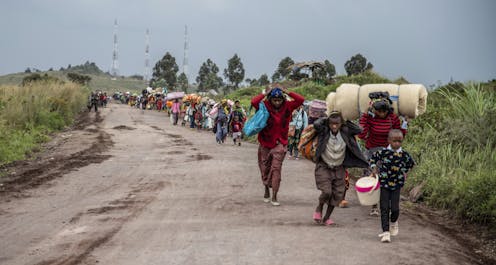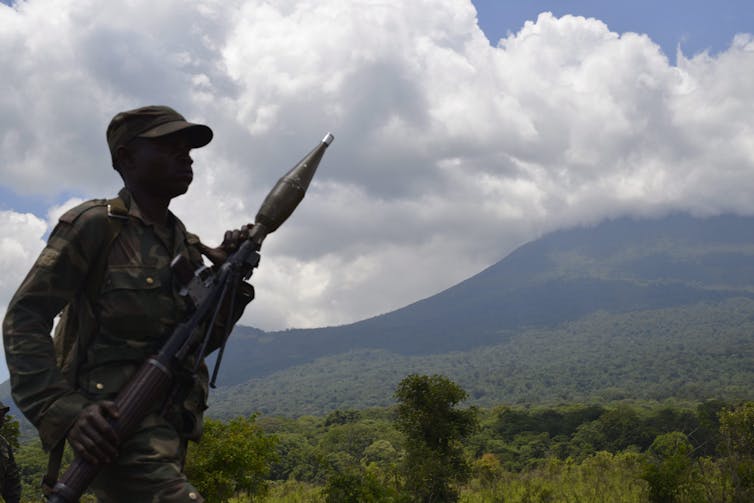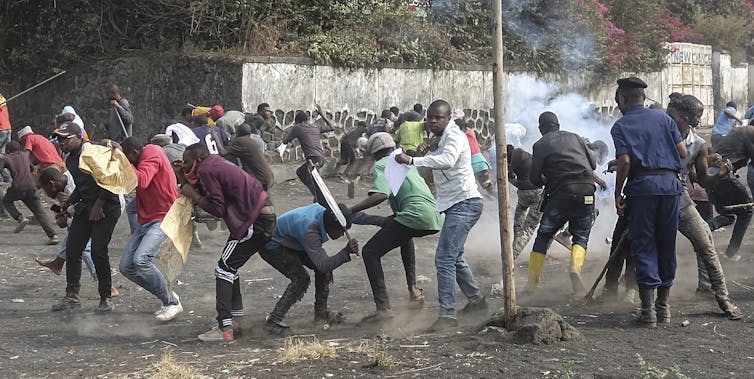
Escalating violence in the Democratic Republic of Congo (DRC) stems from deep economic, political and geopolitical conflict spanning almost three decades.
At the height of what’s been called by experts “Africa’s World War” at the turn of the 21st century, the conflict pitted Congolese government forces supported by Angola, Namibia and Zimbabwe against several opposition armed groups backed by Rwanda and Uganda.
Numbers were difficult to verify, ranging from 2.5 million to 5.4 million, but this period is often cited as the largest loss of life since the Second World War.

There was also widespread rape and sexual violence, child soldiering, forced displacement and human rights abuses.
Recent violence threatens fragile peace in the DRC and the African Great Lakes region. But despite escalating death, displacement and fear, Canadian media have largely ignored the DRC conflict.
In addition to concern for human life, Canadians should care for three key reasons.
1. Mineral extraction
The increasing demand for mobile phones and electric vehicles is linking consumers to violent extraction in the DRC.
The country is rich in minerals and is the source of 60 per cent of the world’s reserves of coltan, which powers our cellular phones. It also produces more than 70 per cent of the world’s cobalt, used in electric car batteries.
The extraction of these minerals comes at great human cost.
Read more: What coltan mining in the DRC costs people and the environment
Researchers have documented the use of child labour, environmental degradation, sexual violence and economic rationale for war — meaning some have profited from mineral exploitation and war while the majority of the Congolese population lives in poverty.
As consumers, Canadians should care about how our purchases are linked to violence and human rights abuses in a globalized world.
2. Canada supports peacekeeping in the DRC
Canada has contributed human and financial resources to peacekeeping in the DRC.
Once the largest and most expensive peacekeeping operation in the United Nations’ history, the UN’s current mandate in the DRC has been scaled back.
Ongoing allegations of UN personnel involved in sexual exploitation, economic profiteering and ineffectiveness have turned the Congolese people against the UN.
Recent protests have been violent, resulting in the deaths of 36 people, including four UN peacekeepers.

The UN has temporarily withdrawn from Butembo, a major city in eastern Congo. The Congolese government has also expelled the UN mission’s spokesperson.
Given Canada’s investments in peacekeeping operations in the DRC, Canadians should demand accountability for alleged human rights violations by UN officials.
Canadian multilateral diplomacy also has a vested interest in ensuring the credibility of UN peacekeeping to maintain and promote peace. The DRC is central to regional stability as the second-largest country in Africa bordering nine neighbours.
3. Canadian-Congolese connections
Ongoing violence in the DRC has caused people to flee Congo to neighbouring countries and to Canada. The DRC consistently ranks among the top countries in terms of alleged persecution in refugee claims in Canada.
Congolese refugees are resettled to Canada through private sponsorship or government assistance streams, and Canada is a destination for Congolese international students. At a time of declining French-language speakers in Canada, Congolese-Canadians make up an important percentage of francophones.
These human connections can be leveraged by the Canadian government for expertise on the situation in the DRC, and Canada’s response.
How should Canadians respond?
Canada is connected to the DRC through the global economy, international peacekeeping efforts and migration. We must not ignore violence because it’s far away.
As consumers, we need to hold companies accountable for ethical sourcing of materials in our cellular telephones and electric vehicles.
We need accurate and timely information on events unfolding in the DRC. If Canadian media do not have resources for dedicated reporting, they should amplify stories from credible local, regional and international news organizations.
As constituents, we need to call on our MPs and the ministers of Foreign Affairs, Defence and International Cooperation for accountability for Canadian and UN peacekeeping in the DRC.
While Canadian officials have said no Canadian personnel were injured in the recent anti-UN violence, they have not publicly commented on the underlying reasons for the protests.
The Canadian government should convene a group of experts, including Congolese-Canadians, to review Canada’s role in the DRC and propose a strategy for current and future peace support operations in the country.
As a long-standing contributor to peacekeeping in the DRC, Canada has a responsibility to ensure that our interventions respect human rights and contribute to lasting peace.
Christina Clark-Kazak does not work for, consult, own shares in or receive funding from any company or organisation that would benefit from this article, and has disclosed no relevant affiliations beyond their academic appointment.
This article was originally published on The Conversation. Read the original article.







